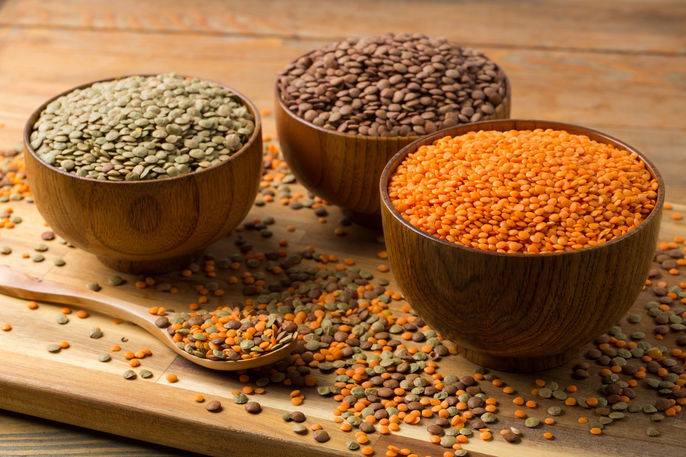Lentils are legumes that are rich in protein, vitamins and minerals. These are nutrients that can offer several health benefits, such as lowering cholesterol, promoting muscle mass gain, boosting immunity and preventing anemia.
Lentils are also rich in fiber, which can keep you fuller and reduce hunger throughout the day. They are a great option to include in weight loss diets.
There are different types of lentils, such as green, red, brown, black, yellow or orange, which vary in thickness and cooking time. This legume is sold in or out its shell, and can be used in recipes for soups, salads, rice and stews.

Health benefits
The main benefits of lentils include:
1. Promoting muscle gains
Lentils are rich in protein, which can lead to increased muscle mass, especially when consumed with rice, pasta or quinoa. Lentils eaten in combination with these grains can help to ensure you are consuming the essential amino acids you need to gain muscle.
Also recommended: 16 Best Muscle-Building Foods to Gain Mass (w/ 3-Day Meal Plan) tuasaude.com/en/muscle-building-foodsLentils are also rich in iron, a mineral that is important for the transport of oxygen in the blood. This property can help to improve your physical performance as well as promote muscle formation.
2. Lowering cholesterol levels
Lentils can help to reduce blood cholesterol levels, as they are a source of soluble and insoluble fiber. High-fiber foods, like lentils, can reduce fat absorption in the gut, and also stimulate bile secretion which can inhibit cholesterol production in the liver.
3. Promoting weight loss
Because legumes are high in fiber and slow down the rate at which food is digested in the stomach, they can help with weight loss. They can help to keep you fuller for longer and reduce your appetite. Read about other foods that can help you lose weight.
However, to lose weight it is also essential to maintain a healthy, low-calorie diet and to be physical active on a regular basis.
Also recommended: How Many Calories Should I Eat a Day to Lose Weight? tuasaude.com/en/how-many-calories-should-i-eat-a-day4. Preventing anemia
Lentils can help to prevent anemia because they are also high in iron. Iron is a mineral that is essential for the production of hemoglobin, a component of red blood cells that is responsible for transporting oxygen from the lungs to the entire body.
Lentils are also rich in folic acid, a vitamin that also promotes the formation of blood cells. Read more about other foods with folic acid that you can incorporate into your diet.
5. Fighting constipation
Lentils are high in fiber, and can add bulk to your stool and trigger natural bowel movements. See other food for constipation that you can incorporate into your diet.
6. Boosting immunity
Lentils are high in protein, which is nutrient that play a role in the formation of immune cells. Therefore eating lentils can help to strengthen the immune system, helping to prevent diseases and infections.
7. Relieving PMS and menopause symptoms
Lentils contain lignans and isoflavones, which are bioactive compounds with properties that act similarly to estrogenic hormones. Therefore eating lentils can help to regulate female hormones and relieve PMS or menopause symptoms like hot flashes and mood swings.
8. Promoting cardiac health
Lentils can promote and maintain your heart health because they naturally contain isoflavones and polyphenols. These are bioactive compounds with antioxidant action that can lower cholesterol and triglyceride levels in the blood, preventing diseases like atherosclerosis and heart attack.
Furthermore, the bioactive compounds present in lentils also inhibit levels of angiotensin I, an enzyme that promotes fluid retention and increases blood pressure.
9. Preventing diabetes
Lentils can play a role in preventing diabetes, as they are rich in fibers that slows down the absorption of carbohydrates. This can help to regulate blood sugar levels and prevent insulin resistance.
10. Preventing osteoporosis
Lentils contain isoflavones, which can promote the production of hormones that help with calcium absorption into the bones. Therefore, lentils can be consumed to reduce bone loss and prevent osteoporosis.
11. Preventing cancer
Lentils can help to reduce the risk of intestinal cancer as they are rich in fibers that feed the good bacteria in the gut. This can help to improve the body's natural defenses and also optimize intestinal functioning.
The lignans, polyphenols and saponins that are in lentils also have antioxidant and anti-inflammatory effects, which can combat free radicals and help to prevent the emergence of prostate and breast cancer.
Do lentils contain lithium?
Lentils naturally contain lithium, and can therefore be consumed to compliment the medical treatment of depression, anxiety and bipolar disorder.
However, more scientific studies with humans are still needed to confirm whether the lithium present in foods is capable of preventing or treating these disorders.
Can lentils lead to weight gain?
Lentils are high in fiber and can take longer to digest, and therefore can reduce appetite and keep you fuller for longer. This legume is also low in fat and are a great option to include in a weight loss diet.
Legumes that are consumed with high-calorie foods, like fritters, sausage or bacon, however, can lead to weight gain.
Nutritional information
The following table outlines the nutritional information in 100 g of legumes, which is equivalent to approximately 5 tablespoons of lentils:
How to cook
To cook lentils, start by rinsing them in water then soaking them in a bowel of fresh water for 8 to 12 hours.
Then, discard the water, place the legumes in a pot and add enough water to cover them. Red lentils only require 5 minutes of cook time, while other colors require around 20 minutes.
Do lentils need to be soaked?
Lentils need to be soaked because they contain phytates, phytic acid and tannins, which are anti-nutritional compounds. When these compounds are consumed excessively, they can cause gas and reduce the absorption of protein, iron and other nutrients.
Furthermore, it is also important to cook the lentils before consuming then, as cooking also reduces the anti-nutritional factors present in them.
Contraindications to consider
People with irritable bowel syndrome should avoid lentils, as this legume contains carbohydrates that are difficult to digest and can cause bloating, gas and diarrhea.
Lentils also increase gas production, which can lead to abdominal pain and cramping. Therefore, lentils should be avoided by anyone with diarrhea and ulcerative colitis. Check-out other foods that can cause gas that you should consume in moderation.
Also recommended: Ulcerative Colitis Diet: Food to Eat & Avoid, Meal Plan & Supplements tuasaude.com/en/ulcerative-colitis-dietHealthy lentil recipes

Check-out some healthy and tasty recipes using this legume below:
1. Lentil soup
Ingredients:
- 1 cup of soaked lentils
- 1 onion, chopped into cubes
- 1 medium potato, peeled and cut into cubes
- 2 cloves of chopped garlic
- ½ cup of grated carrot
- 4 cups of water
- 2 tablespoons of olive oil
- 2 bay leaves
- Salt and black pepper to taste
Directions
Add 1 tablespoon of olive oil, onion and salt to a pot, and heat over medium heat. Sauté for about 3 minutes or until the onion is golden. Add the rest of the olive oil, bay leaves, cumin and carrot, and sauté for another 3 minutes.
Add the water, lentils, potatoes and black pepper, mixing well and increasing the heat. Once it starts to boil, lower the heat and let it cook for 15 minutes or until the potatoes and lentils are soft. Remove from heat and serve immediately.
2. Lentil rice
Ingredients:
- 1 cup of soaked lentils
- 2 cups of rice (rinsed in water)
- 1 tablespoon of olive oil
- 2 cloves of chopped garlic
- 3 cups of water
- 1 bay leaf
- Salt and black pepper to taste
Directions
Add the olive oil and garlic cloves to a pot and sauté for 2 minutes over medium heat. Add the rice and lentils, sautéing for another 3 minutes. Add the water, salt, bay leaf and black pepper, and mix all the ingredients well. Cover the pot and cook until the rice and lentils are soft. If necessary, more water can be added during cooking.
3. Lentil and potato salad
Ingredients:
- 100g of soaked lentils
- 450 g of potatoes, peeled and cut into cubes
- 1 medium onion chopped into small cubes
- 1 tablespoon of olive oil
- 2 tablespoons of balsamic vinegar
- Salt and pepper to taste
Directions
Place the lentils in a pot and cover with water. Cook for 20 minutes or until soft. Drain the lentils and set aside. In another pot, place the potatoes in boiling water and cook for 10 minutes or until they are al dente. Drain the potatoes and place them on a platter. Add the onions, lentils, oil, vinegar, salt and pepper, mixing well and then serve.






























